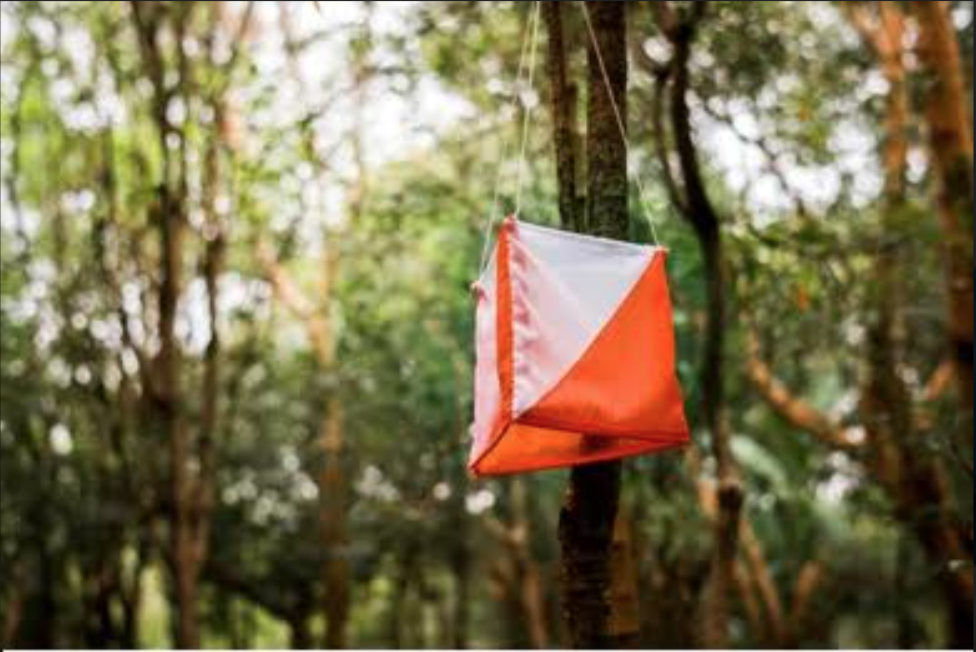by Joel BatesA couple of the DM staff got the hair-brained idea that it would be fun to enter an adventure race; what’s worse is that they thought I should join them! I unequivocally dismissed the idea of gallivanting all over God’s green earth on foot, in a canoe, or on a bike to search for elusive waypoints with nothing but a map and compass. Then they reminded me that this is pretty much what we do every day. “And besides,” they lured, “They give out free hamburgers at the end of the race.” I do love a good hamburger! By the time race day came, I was all in. When we received our start maps and the coordinate grids, we diligently began plotting our course and devising a strategy. Since we had purchased special gear and equipment and paid out our cold hard cash for the entrance fee, we were invested in the race. When the starting gun blasted, we sped toward our first waypoint flag, our fresh muscles fueled by determination, confidence in our skills, and a few too many energy bars. From our canoe, we could see that we were in the lead as we located the first flag, punched our ticket, and threw our backs in to paddling to the next waypoint. Jubilantly we beached our canoe on the far shore of the lake to begin the hiking leg of the race. We were orienteering over rough country, and we were in our element. As other teams poured onto shore directly behind us, we joined in the common mayhem of gathering our bearings and finding the next flag. We had bagged 5 flags already from the lake portion and were speeding though the brambly hills and hollers, collecting flags six and seven and feeding ourselves a steady dose of overconfidence. Numerically flag eight was next, but our course plan was to take a little side detour to collect the solitary flag nine, which lay at the top of a hollow a half mile off-route to the east. I carried the map and paused every so often to get my bearings and establish a route. We had picked our way along a small creek that intersected with a valley that ran toward flag nine. Knowing from experience that untended valleys are generally overgrown, I indicated that the ridge running along the east of our end goal would likely be a better path of travel. Without hesitation, we set off up the ridge. We had been fast walking and slow jogging for a while when I suggested we scout for the flag. I was pretty sure we were in the right location. The others couldn’t really argue since they had not been carrying the map. We fanned out across the ridge looking for the flag. After a time we rallied together on a high point in the forest. “Are you sure this is the right place?” a team member asked. As I laid the map down on the ground to take a more detailed look at it, that question echoed through my mind, and I remembered past DM expeditions. I had asked the leaders the same question and discovered that no matter where they were and how confident they felt, the feeling of uncertainty lurked. “Maybe I was a little bit off,” I said reassuringly. “I’m sure we’re close to the flag. Let’s expand our search.” Our second search produced no better results. We hadn’t found flag nine, but instead of admitting that I didn’t know where I was, I began blaming the race officials for likely giving us coordinates that were incongruent with the flag’s actual location. In essence, I was shifting blame, throwing someone else under the bus. The more we searched the more lost I felt. Soon nothing seemed to match the map and worse, the realities of the situation denied my self-created identity: “I don’t mess up at reading maps and compasses,” I chastised myself. Nevertheless, the fact that flag nine eluded us told a different story. Identity aside, I felt the pressure of investment. We had paid the cost, made the plan, and put in the time, so finding this stupid little flag in the middle of the backcountry became my greatest aim in life. The more we searched for the flag, the more obsessed we became in finding it. It wasn’t about winning anymore, it was all about not losing. There is a difference, you know. In Philippians 3, the apostle Paul tells us to keep our eyes on the prize. He said he looked ahead to the victory forgetting about what was behind and strained toward the finish to win. Isn’t it strange that we live our lives and forget what we’re racing for? After a while, all we can see is what we have to lose. Running toward something is always better than running away from something. The pressures and motivations are vastly different. Running to the prize is motivated by hunger for the victory, the pleasure of competing, and euphoria in finishing to hear the words, “Well done!” However, running from is far more difficult for our soul because we are constantly looking back, feeling chased down as if we are running in terror from a beast that will eventually overtake us. It’s a weary way to travel, one that robs us of abiding peace. Moreover, what is worse is that when we race so as not to lose, all the burdens are weighing on us so we cannot bear the cost of losing. As we stood there bent over panting, I had to admit that I didn’t know exactly where I was anymore. Our searching and striving had disoriented me even more. In a moment of sheer surrender, I took a deep breath and simply said, “I think we had better go on to find flag 8.” The team was silent. What about all the time we had spent searching? How could we afford just to abandon the mission? This was valuable time that would be totally wasted if we came away empty handed. We wanted to produce something for our efforts, and the harder and longer we searched the heavier the weight of success became. These thoughts were going through everyone’s mind, but we knew we had to let it go. The searching and striving had to stop. We needed to redirect our thoughts and reorient ourselves to the map so that we could press on toward a new goal. Paul alludes to this concept of loss when in the same breath of talking about pressing on to the prize, he utters the words to “count everything a loss in comparison with finding Christ.” Paul lists his pedigree and privileged life, his education and achievements, and even the adventures he could brag about and the service to God he could boast in. Then with one sobering word, he relegates them to their rightful place, “Rubbish!” Remember the rich young ruler who came to visit Jesus? Maybe he wanted to become a disciple and retain his status. Maybe he wanted validation for his good deeds, establishing him as the head of the class. Maybe he wanted to have some participation in the acclaim of the Savior and the popularity of the Messiah. He did not get the answer he was looking for. Jesus simply said, “If you want to be my disciple, let go of all your stuff, give it away, and then follow me.” The man went away sad, weighed down by the piles of rubbish he had worked so hard to accumulate. Letting go would indicate that he had wasted his life. It was too much to bear.
Later that day, after the race was over, I sat contentedly eating my hamburger and thinking about flag nine. I wondered where it was out there in the quiet woods. It bothered me a little that I would never know. Then with a mouthful of food, I glanced down at my fifth place medal. The token, little more than a participation award, meant something to me. It represented where the race had really begun. You see, we did collect many other flags that day, enough in fact to propel us to the top five finishers. We had done well after all, and for me the race began when I was willing to let flag nine remain unfound. Only then could I begin again. Only then could I turn my gaze on the prize. What’s your flag nine? What’s something you need to let go of?
1 Comment
|
Come along side us as we journey in and out of the wilderness, discovering our Creator in creation.
Archives
July 2024
Categories |
Contact Us
|
|



 RSS Feed
RSS Feed

